Gateway NV58 (Intel) - OS Benchmarks
Wrapping up our look at OS performance on the NV58, we have our OS boot/shut down, hibernate/resume, and sleep/wake test results. As with the NV52, there was a fair amount of variability between test runs. We took the best result of numerous runs for each OS. Once more, note that Windows XP will have an advantage in the hibernate/resume testing because we are using a 32-bit OS (3GB addressable RAM) instead of a 64-bit OS (4GB addressable RAM). No OS wins - or loses - in every single category, but Windows XP and Win7 are usually near the top and Ubuntu and Vista are near the bottom.
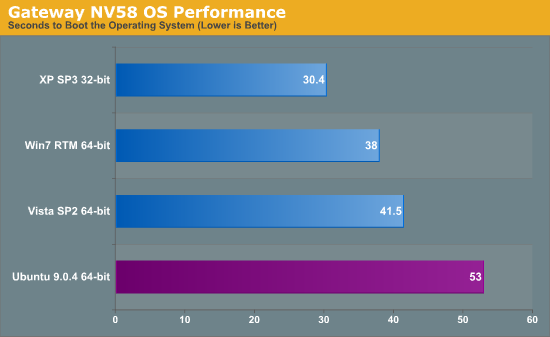
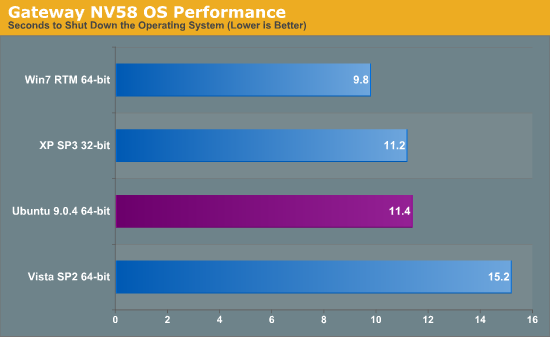
XP loads the fastest once again, this time leading the competition by a larger margin than on the NV52. Windows 7 takes 25% longer to boot, Vista takes 36% longer, and Ubuntu is in last at 74% longer than XP. The GRUB delay is a large portion of the poor showing for Ubuntu, though; it would be very close to the Vista result without the extra ~10 seconds. Shut down times new Windows 7 into the lead, with XP and Ubuntu essentially tied at around 15% longer than Vista bringing up the rear taking 55% longer than Win7.
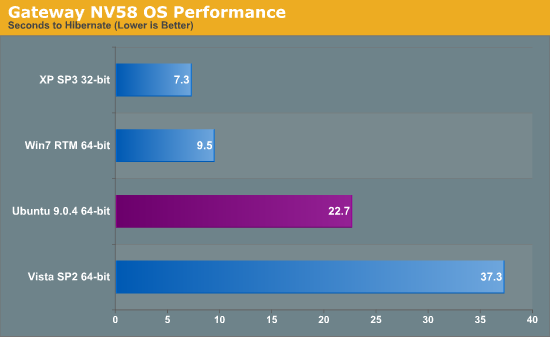
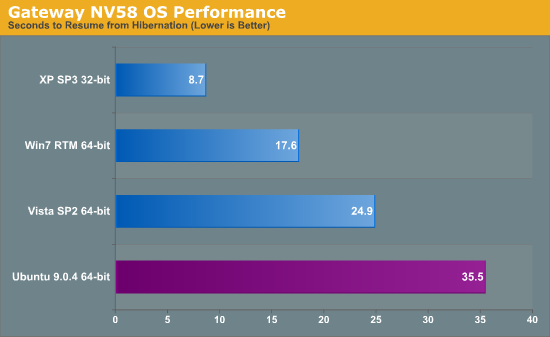
As expected, Windows XP leads in hibernate/resume times since it doesn't have to deal with as large of a hibernation file. Windows 7 trails XP in hibernate times by 30%, correlating very well with the difference in addressable memory. Ubuntu is in third place, requiring over three times as long to hibernate as XP (211% longer). The Vista result is the worst by far, taking 411% longer than XP. There's again the question of whether drivers are somehow at fault, but whatever the cause the NV58 took substantially longer to hibernate on Vista every single time. Resume times don't change the standings much, except Windows XP holds an even larger lead and takes less than half as long as the next closest competitor, Windows 7, which requires 102% more time. Windows Vista doesn't do as poorly in the resume times, though it still trails XP by 186%. Ubuntu is in last place taking just over four times as long to resume as XP, but again the 10 second GRUB penalty is at play.
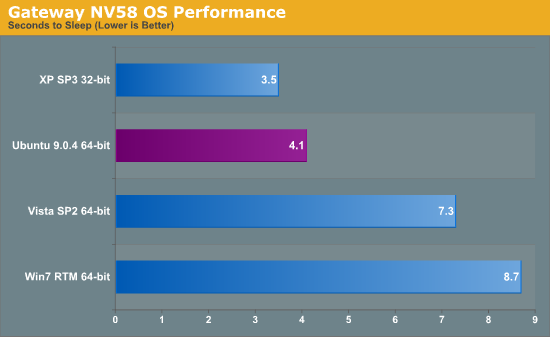
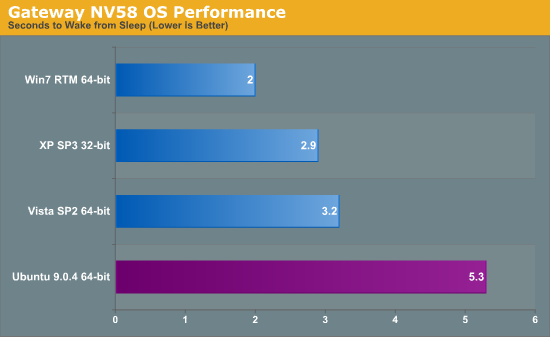
Finally, in sleep times Windows XP again leads, this time followed by Ubuntu which is very close at only 17% longer. Vista takes 109% longer than XP and for once Windows 7 brings up the rear requiring 149% longer than XP to go to sleep. Interestingly, Win7 is the fastest when it comes to waking, requiring just 2 seconds. XP and Vista are 45% and 60% longer, but they're both only around three seconds. Ubuntu is last taking 165% longer than Windows 7, with a result of 5.3 seconds. Since we're dealing with such short times with sleep/wake cycles, the raw percentages and charts aren't nearly as meaningful. As mentioned before, Ubuntu and Win7 tend to be a little more consistent, whereas the best-case results for XP and Vista can be an order of magnitude faster than the worst-case results. If nothing else, Ubuntu is very consistent at going to sleep in around 5-10 seconds; Windows 7 sleep times range from just under 9 seconds up to around 30 seconds, and XP and Vista can take over a minute to go to sleep at times. The difference between 5 seconds and 10 seconds is somewhat annoying, but it's not a huge issue unless you're putting your system to sleep constantly. Occasional delays of over a minute on the other hand can be truly frustrating. For what it's worth, toss in an SSD and the sleep/wake times all appear to be far more consistent (though we didn't conduct in-depth testing on either of these notebooks with SSDs).










106 Comments
View All Comments
JarredWalton - Tuesday, September 22, 2009 - link
What I would love is to have a definitive Linux source that I can use that will "just work". But that's probably asking too much. I've now got suggestions to try the Ubuntu Netbook Remix, Moblin on the NV58, and Archlinux.And hey, if anyone lives near Olympia, WA and wants to come give the Linux install some fine luvin' let me know. LOL
stmok - Wednesday, September 23, 2009 - link
quote('What I would love is to have a definitive Linux source that I can use that will "just work".')That isn't going to happen. Simply because Linux isn't Windows or OSX. They approach things with different paradigms.
Per Hansson - Tuesday, September 22, 2009 - link
Hi, something I have noted when installing AMD laptops with a clean RTM WinXP disc and not the bundled one that includes all drivers + lotsa more crap you don't want;In all cases the systems have not been throttling the CPU speed or CPU voltage, I have had to install the AMD PowerNow! driver and then everything has worked (even though both AMD and Microsoft say this is included with XP!)
The difficult part is actually finding the driver, since both AMD and MS feels it is not needed it can be a real pita, please verify with CPU-Z or similar if your systems have this issue
JarredWalton - Tuesday, September 22, 2009 - link
Vista definitely worked properly - I saw CPU speeds of down to 1050MHz (5.25 x 200) on the NV52. Since XP and Win7 both achieve similar results, I think it's working right but would have to check. I'll try to be more careful for the next tests. :)jasperjones - Tuesday, September 22, 2009 - link
I assume you ran Ubuntu with the 32-bit Flash plugin (that's available on x86-64 via nspluginwrapper (Netscape plugin wrapper).I'd be curious to see how results are with the native x86-64 Flash which is available as an alpha on Adobe Labs.
For the last two or three years, I've had nothing but problems with 32-bit Flash on a 64-bit OS and those problems finally somewhat subsided after moving to the 64-bit native alpha build.
clavko - Tuesday, September 22, 2009 - link
Actually, graphics card power management with open source ati drivers (xf86-video-radeon and xf86-video-radeonhd alike) is not up to par with custom power management of fglrx proprietary driver. If tests were made using open source drivers, some of the battery time difference should account for that.However, I find it quite fair comparing Windows to Ubuntu, given that Ubuntu really is considered vanilla, desktop user distro. Obviously, things are not exactly "there" yet, but I'd be interested in power consumption with newer fglrx drivers, perhaps on OpenSUSE.
strikeback03 - Tuesday, September 22, 2009 - link
On my laptop (T40, 1.86GHz Pentium M Sonoma) I primarily use Ubuntu, with XP when I need Photoshop or Lightroom. I never measured the battery life exactly, but never felt it was that different, certainly not by a third. Do you have the scripts to run the internet test I could try and see what my results are?I also never felt Firefox was notably different between XP and Ubuntu, both misbehave in different ways. The notable exception is flash in 64bit Ubuntu on my desktop, which is of course more hit-or-miss.
JarredWalton - Tuesday, September 22, 2009 - link
Send me an email.gwolfman - Tuesday, September 22, 2009 - link
When I originally purchased my Dell Mini 9, it shipped with Ubuntu. Rather than coming with the standard/original kernel, it came with the Low Power Intel Architecture (LPIA) kernel. I'm not sure what optimizations are done with regards to the kernel, but do you think it's worth looking into with regards to the bad numbers you got from the default kernel bundled with your Ubuntu install? Maybe there are some optimizations for battery life in there that are not included in the standard kernel.vol7ron - Tuesday, September 22, 2009 - link
As nice as these tests are, I think the reliability/consistency may be overlooked a little bit. I'm not saying it's not reliable/consistent enough, you've already touched on that in the final paragraph, with regards to the websites themselves. What I'm saying is that there are other factors that may be affecting battery life.Are you using a multimeter to measure the power consumption, or are you just letting the battery drain and measuring time? I'm guessing that if you just let your computer start up and run it's battery drain naturally (no erroneous applications running), the battery life would also vary in minutes.
I also am assuming that these devices aren't cooled to the same temperature, before tests begin. Heat not only dissipates the energy stored in the battery, but it also requires more power to the fans for cooling. As I've touched on in another article, processor speeds vary - that's something that is truly hard to keep consistent, since it is irrelevant to BIOS settings. It'd be interesting to see if a processor running at 2.096 vs one running at 2.104 over an extended period of time has enough impact on battery life.
That being said, it's also known that processors vary in clock speed even after it's started, so I'm not sure if any points I've made can be applied in setting a realistic control at this point.
My last point is about the battery itself. Manufacturers claim the battery is "good for" a certain period of time, but these batteries are often "cheap" in quality. I think a few uses could impact the natural battery life; this goes back into testing regular start-up/shut-downs, w/o running any tests.